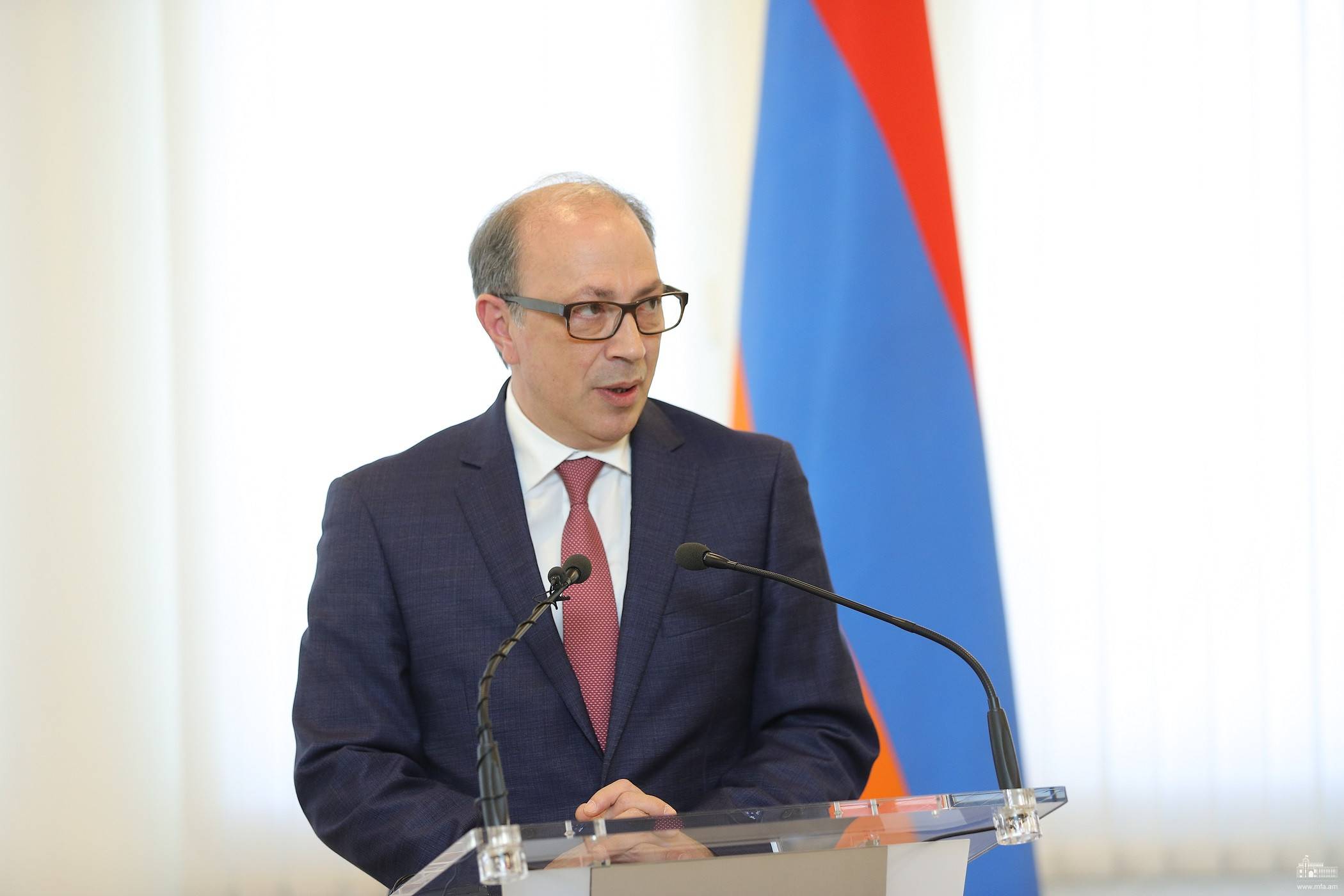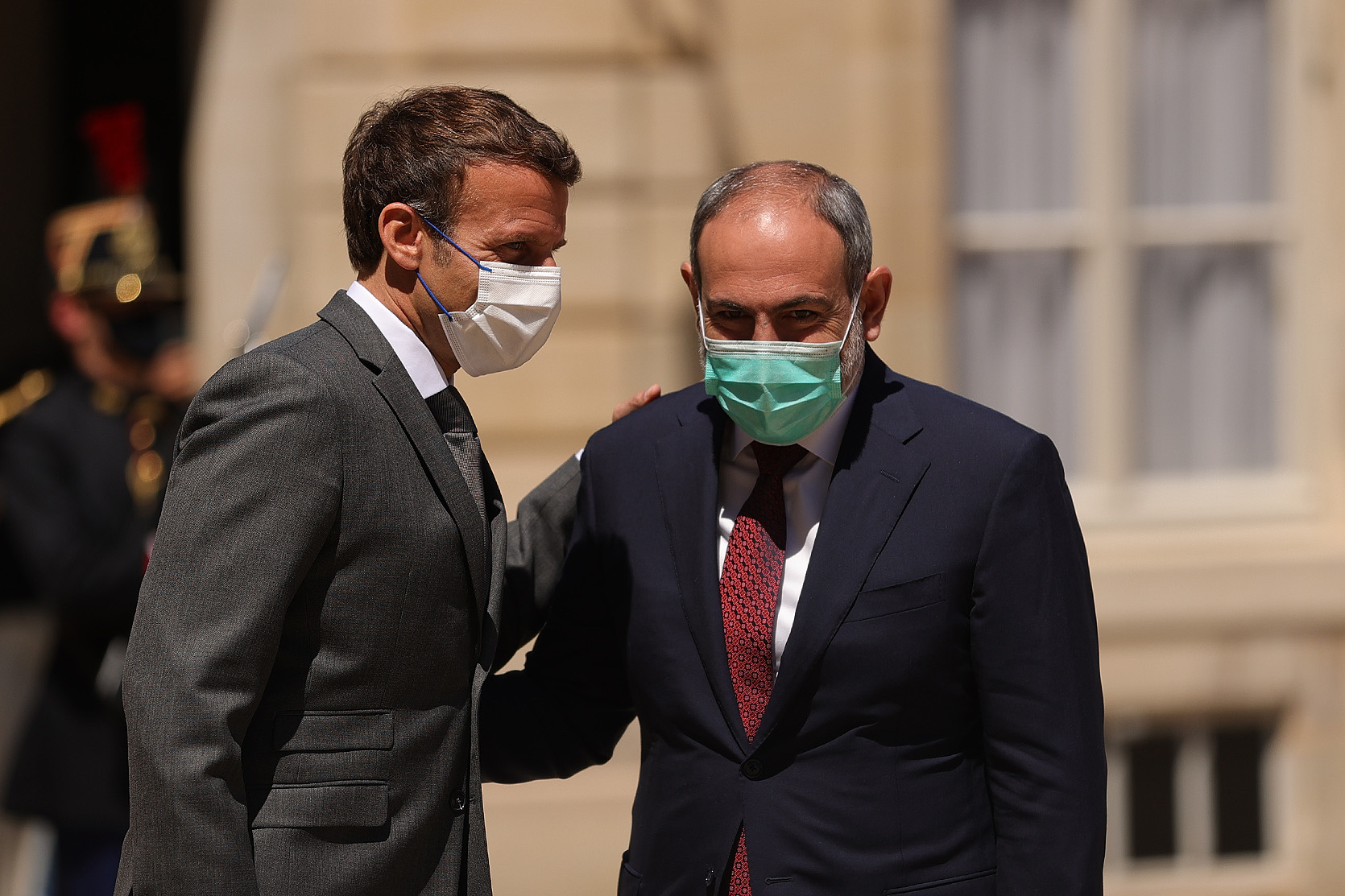Several senior members of the Ministry of Foreign Affairs of Armenia (MoFA) have announced their resignations amid the ongoing crisis along the Armenia-Azerbaijan border.
During a farewell meeting with the staff of the MoFA on May 31, former Foreign Minister Ara Ayvazyan asserted that he resigned in order to “make sure that there are never any suspicions that this ministry could take some steps or agree to some ideas, initiatives, which go against our national and state interests.”

Ayvazyan announced his resignation following an emergency meeting of the Security Council on May 27. During the meeting, acting PM Nikol Pashinyan detailed his proposal to deploy international observers from Russia or the other OSCE Minsk Group co-chair countries along the Armenia-Azerbaijan border, following the return of Armenian and Azerbaijani troops to their May 11 positions. Border checkpoints would then be adjusted under international auspices.
The meeting was triggered by the capture of six Armenian servicemen by Azerbaijani forces that penetrated the province of Gegharkunik. On May 12, hundreds of Azerbaijani soldiers invaded the provinces of Syunik and Gegharkunik, and despite ongoing negotiations, an estimated 500-600 Azerbaijani troops remain within Armenia’s border regions. The government of Azerbaijan claims that its military has not encroached upon sovereign Armenian territory, but rather has taken on new posts within its borders.
On May 31, Press Secretary for the Foreign Ministry Anna Naghdalyan and Deputy Foreign Minister Gagik Ghalachyan also announced their resignations. Naghdalyan noted that she will continue her work in the diplomatic service.
Ayvazyan did not specify whether he resigned in reaction to Pashinyan’s proposed plan for deescalation and border delimitation. Press Secretary for the Office of the Prime Minister Mane Gevorgyan asked him to clarify his meaning in a message to the press. “While we thank Mr. Ayvazyan for his work, we believe our national and state interests require Mr. Ayvazyan to publicly explain who was going to take some steps, when, where and how, or to make decisions contradicting our country’s national and state interests, ” she told reporters.
Tensions between the Office of the Prime Minister and the Foreign Ministry previously became public when the latter declared that it had no previous knowledge of a working agreement between Armenia, Azerbaijan and Russia that was leaked on May 19. The document called for the creation of a joint commission to demarcate and delimitate the Armenia-Azerbaijan international border. Rumors circulated that the agreement also involved the concession of Armenian territory. Pashinyan insisted that the MoFA had access to the document.
Deputy Prime Minister Mher Grigoryan also asked Ayvazyan to clarify the details of the reasoning behind his resignation. He denied the existence of a secret agreement with Azerbaijan that is contrary to national interests, stating that all discussions on resolving the border crisis have been made “maximally public.”
Grigoryan further informed reporters that the working group chaired by the deputy PMs of Armenia, Russia and Azerbaijan for the purpose of unblocking all regional economic and transport links has suspended its operations in response to the border crisis. The group was envisaged by a January 11 joint statement, which aimed to fully implement the November 9 trilateral ceasefire agreement by reviving Soviet-era transport routes connecting Azerbaijan with the Nakhichevan Autonomous Republic and Armenia with Iran and Russia.
Contact between the members of the working group has been discontinued for the time being. Grigoryan told reporters that he does “not think that constructive work is possible on this platform” considering the instability along the border.
The European Union welcomed Pashinyan’s proposal for an international observation mission along the Armenia-Azerbaijan border, offering to provide expertise and help on border delimitation and demarcation. The EU also reiterated its call on Azerbaijan to release all prisoners of war without delay in a statement by the foreign affairs spokesperson Peter Stano.
The OSCE Minsk Group co-chairs also released a statement in response to Pashinyan’s speech calling for the release of all prisoners of war on an all-for-all basis. The co-chairs welcomed the immediate relocation of troops and offered to assist in facilitating negotiations to delimitate and demarcate the border peacefully. They did not comment, however, on Pashinyan’s proposal for the deployment of international observers by the OSCE Minsk Group.

French President Emmanuel Macron reiterated his support for demarcation and delimitation of the border through negotiations during Pashinyan’s visit to Paris this week. “The Azerbaijani troops must leave Armenia’s sovereign territory,” he said following a welcome ceremony at the Elysee Palace. “I call on the parties to return to the positions they stood at as of May 11.”
While France and the United States have publicized their demands for Azerbaijani forces to relocate to their May 11 positions, Russia has not formally called for the withdrawal of Azerbaijani soldiers from Armenian territory. Following a meeting between Armenian and Russian Defense Ministers Vagharshak Harutyunyan and Sergey Shoigu on May 28, the Ministry of Defense of Armenia announced that the parties had “reached an agreement on the necessary steps” to resolve the border crisis, without sharing further details.
The Armenian MoD further denied accusations that 40 Armenian soldiers crossed the border into Azerbaijan on June 1, condemning disinformation spread by the Azerbaijani military-political leadership in order to “counterbalance the provocations of the Azerbaijani Armed Forces to invade the territory of the Republic of Armenia on May 12-13.” The MoD of Azerbaijan had previously accused the Armenian military of opening fire at various positions along the international border and in the direction of Shushi, which the command of the Russian peacekeeping mission in Artsakh promptly refuted.
Meanwhile, Armenian officials have been forced to apologize after photos circulated online depicting the remains of fallen soldiers from the 2020 Artsakh War stacked haphazardly in body bags in a dirty, unrefrigerated room. The remains belong to soldiers who have been identified but are yet to be collected by their family members from the morgue at the Abovyan branch of the Forensic-Medical Center in the outskirts of Yerevan.
“I would like to apologize to all the relatives for the improper maintenance of the bodies and remains,” Minister of Health Anahit Avanesyan wrote. “It was my omission that after some relocations I did not personally visit again to make sure about the details of the maintenance of the remains.”
The head of a state center of forensic medicine overseeing the Armenian mortuaries Mher Bisharian told RFE/RL that the remains of the soldiers were taken to the Abovyan facility and temporarily stored in its basement after a refrigerated morgue truck where they had been previously kept broke down. They have been transported to a refrigerated facility in Martuni.
The MoH has denied media reports that it is hiding corpses in order to conceal the real number of war casualties.
The photos were shared on May 31 by Mikayel Minasyan, son-in-law of former President Serge Sargsyan and former ambassador to Vatican City. “After seeing this scene, who would want to sacrifice their lives for the homeland?” he wrote.
The Office of the Prime Minister has launched an investigation to determine “whether the issue has been caused as a result of the careless actions of the responsible official,” Gevorgyan told reporters.
The search and identification of military casualties from the war is ongoing. The MoH reports that it has not been able to obtain DNA samples from the remains of 50 people. It has conducted DNA testing on 150 other corpses, yet their DNA samples do not match with any of the parents in their database. While officials report that approximately 4,000 Armenian soldiers died in the war, this number is not verifiable while search operations continue and an unknown number of prisoners of war remain in Azerbaijani captivity.
Author information
The post Departures from Foreign Ministry amid border crisis appeared first on The Armenian Weekly.
